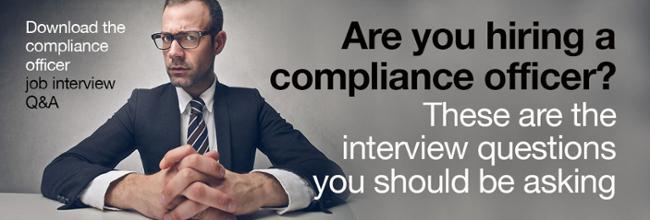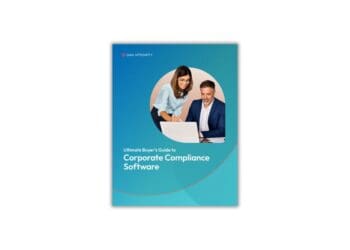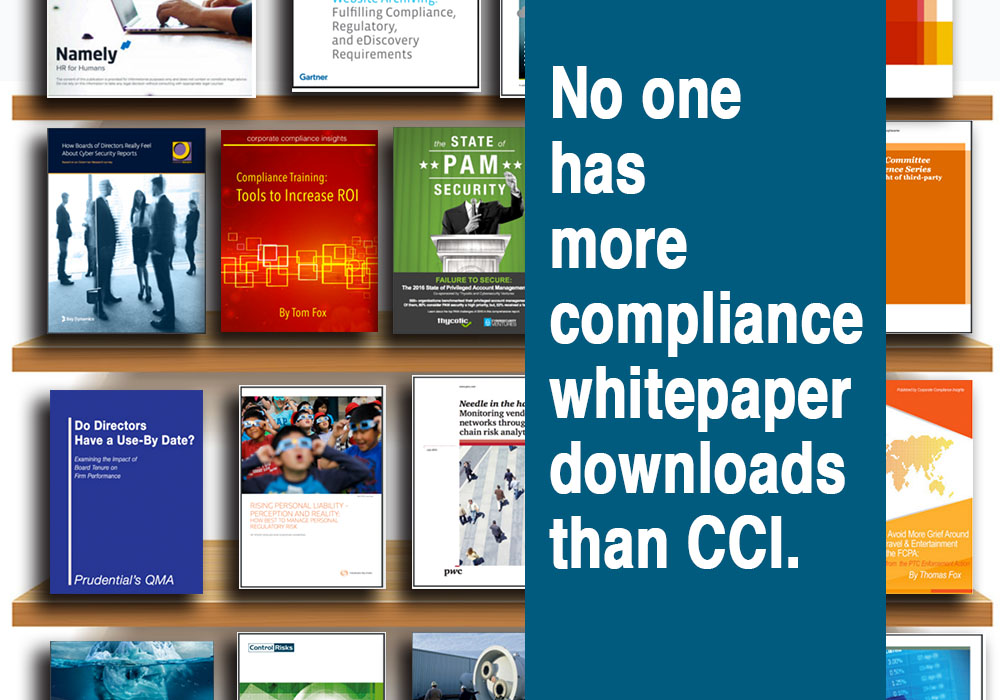Today we’re pleased to publish an interview between Maurice Gilbert, Corporate Compliance Insights’ Founder and CEO, and Manuel Martinez-Herrera, VP of Legal and Compliance at Namely. Namely is the leading HR platform for midsize companies and an all-inclusive solution for HR administration and compliance. Manuel offers insight into some of the greatest threats facing corporations today and explains how the Namely platform helps to mitigate those risks.
Maurice Gilbert: How did you get started on a career in law and compliance?
Manuel Martinez-Herrera: It all happened in a very serendipitous way. I’m originally from Madrid, Spain. When I was 17, I spent a summer in Nantes, France, learning French. While there, I met an older friend who was going to law school. I should point out at this point that law in Spain, as in many other countries, is an undergraduate degree. At the time, I was undecided on what to study in college. This friend convinced me that law school was the way to go. As my parents can attest, even before entering kindergarten, I already had a special talent at arguing any case, especially my own. Thus, law school seem like a good fit.
Now, almost 20 years after, I can proudly say that that decision allowed me to embark on an international journey, thanks to which I have studied or worked as a lawyer on three different continents and in six cities (in chronological order: Madrid, Dijon, Barcelona, Buenos Aires, Boston and New York).
MG: Who helped shape your views?
MMH: I have been fortunate enough to have a number of amazing mentors help me become a much better lawyer and compliance professional at every stage of my career. However, I have to say that my family and friends have been especially important in shaping my views of the world and how I tackle my legal duties.
Some of my friends are wonderful lawyers with uncompromising moral and ethical standards working in academia or NGOs (shout out to my good friends Sarah Knuckey in New York and Alejandro Gamez Selma in Madrid!). Their work is especially inspiring to me, and helps me understand how important it is that corporations behave in a highly ethical and compliant way.
Finally, one of my uncles is a journalist, but deep in his heart he is a frustrated historian. He has researched the genealogy of my family back to the 1500s. His passion to find the missing link or piece of information has always inspired me and reminded me to not leave any stone unturned in my legal and compliance work.
MG: How do you stay current on ethics & compliance issues?
MMH: I’m an avid reader of legal publications. In addition, the Namely team always keeps a close pulse on compliance, providing a thorough weekly compliance update which compiles the latest news in compliance and HR legislation based on internal resources and sources like SHRM, Bloomberg BNA, law firms, etc.
Finally, I have a strong network of colleagues working either at law firms or in-house as counsels or compliance professionals that I can frequently tap into.
MG: How do you effect change within a client’s environment?
MMH: You cannot effect change without understanding the culture of the company and the products it sells. My first order of business is always to understand how things are done and why they are done in that precise manner. Once you understand and respect the rationale behind certain actions, you can clearly articulate to the business what needs to be changed and why.
I’m very fortunate to be working at Namely, where compliance is considered key. The tone is clearly set by our board and CEO, who have provided me with all necessary resources and assistance to succeed in my job. All employees understand that compliance is a must. The question is never “how can we avoid this new regulation?” The question here is “what do we need to do to make sure we are ready and comply with this new regulation?”
MG: What do you see as the greatest regulatory risks facing companies today?
MMH: We live in a world of ever-evolving regulations. For midsize companies with small legal and compliance departments, keeping tabs on all of the new regulations – and changes to existing ones – is a challenge in itself. Furthermore, many regulators are becoming very proactive and taking, in certain cases, very broad extraterritorial views on the applicability of the laws they enforce. This creates challenging situations in which companies do not have total clarity as to whether certain laws apply to them or not.
Specific regulatory areas that I see as challenging are data privacy and cybersecurity – where laws cannot evolve as quickly as technology, insurance and employment law.
MG: How might companies and compliance departments prepare to face these risks?
MMH: I always say it is difficult, if not impossible, to be 100 percent compliant – but it is crucial that you try very hard. Trying starts with making sure the company has the right culture from top to bottom. The leadership group is key in implementing and disseminating this culture. You then need to have a strong legal and compliance department that understands the business your company operates. It is also very important that within the different lines of business, there are SMEs that can detect potential compliance flaws and bring legal and compliance to the table early on in the process.
MG: How does Namely help its clients mitigate risk?
MMH: I’m proud to say that in we do this in many ways. The platform itself, as more fully described below, is of great assistance to HR and payroll professionals in ensuring compliance with both laws and regulations.
For benefits brokerage, our team is extremely seasoned and savvy. It is amazing how they help our clients navigate the myriad of potential pitfalls associated with the purchase of employee benefits.
Finally, our client success team is always available to help our clients understand any questions they might have.
MG: What is your new role at Namely and what will be your responsibility?
MMH: I’m Namely’s VP for Legal and Compliance, and I head a group of outstanding legal and compliance professionals. In this new role, I focus on ensuring that Namely’s technology, operations and service continue to meet compliance standards as regulations evolve. I also serve all of the legal needs of the company and its three lines of business (HR SaaS, payroll and benefits).
MG: What role do you think technology platforms like Namely have to play in this changing regulatory environment?
MMH: Technology platforms like Namely have a very important role to play in this changing regulatory environment. In today’s regulatory environment, HR professionals need a solid understanding of new laws — plus strong compliance processes supported by technology. It’s clear that Namely has focused on these areas since day one, which has had a tremendous impact on its clients’ day-to-day operations.
Namely enables HR professionals to have all their company’s HR data at their fingertips so they can quickly react to any regulatory need. The platform is also highly customizable in helping companies efficiently adapt to changes. For example, the vacation/leave and time and attendance functions can help clients comply with overtime and paid leave laws.
Moreover, the Namely payroll features help ensure that payrolls are processed timely and accurately and that the right tax deposits are made at the federal, state and local levels.

MG: What are some of the top trends from The Pro Employee Tide: Trends in HR Compliance report that compliance professionals should be aware of? Why do you think 2016 has been such a historic year for these regulations?
MMH: The overarching trend we found is that, from a regulatory perspective, employees are being granted more rights and better working conditions. Or rather, employees in some states and cities are being granted more rights and better working conditions. Let’s not forget that the U.S. is one of the very few countries in the world that does not have a national paid maternity leave or vacation law, even though a significant part of the population, especially millennials, seem to be in favor of passing such laws.
In my opinion, this trend is a reflection of a cultural shift which, of course, is a driving force in causing the laws to be passed in the first place.
MG: How are pro-employee regulations posing challenges for mid-market companies in particular?
MMH: The main challenge I see for midsize companies is the fact that these new laws and regulations are being issued only by some states and cities instead of at a federal level, creating a patchwork of different regulations. This patchwork is very difficult to navigate for companies operating in multiple states. It is easy to see how having to comply with so many rules can cause trouble and significant expense. Midsize companies operating in multiple states will need very strong in-house HR, legal and compliance departments that are knowledgeable on all the different federal, state and local mandates to make sure they do not run afoul of any of them. But they often don’t have these resources. They will also likely have to spend money on HR consultants and law firms to make sure their policies and practices are up-to-snuff.
However, the recent speeches of some prominent DNC and RNC speakers suggest that we may see more changes, particularly around equal pay and paid leave regulations, in the next presidential term.
We should also mention the fact that the employees working in states/cities that have not passed these types of laws may not be particularly happy that their colleagues performing the exact same job a few miles away are getting these “perks.”
 Manuel Martinez-Herrera is Vice President of Legal & Compliance at Namely. His over 10 years of experience as a lawyer has spanned three continents and included positions at large international law firms and multinational insurance companies.
Manuel Martinez-Herrera is Vice President of Legal & Compliance at Namely. His over 10 years of experience as a lawyer has spanned three continents and included positions at large international law firms and multinational insurance companies.















